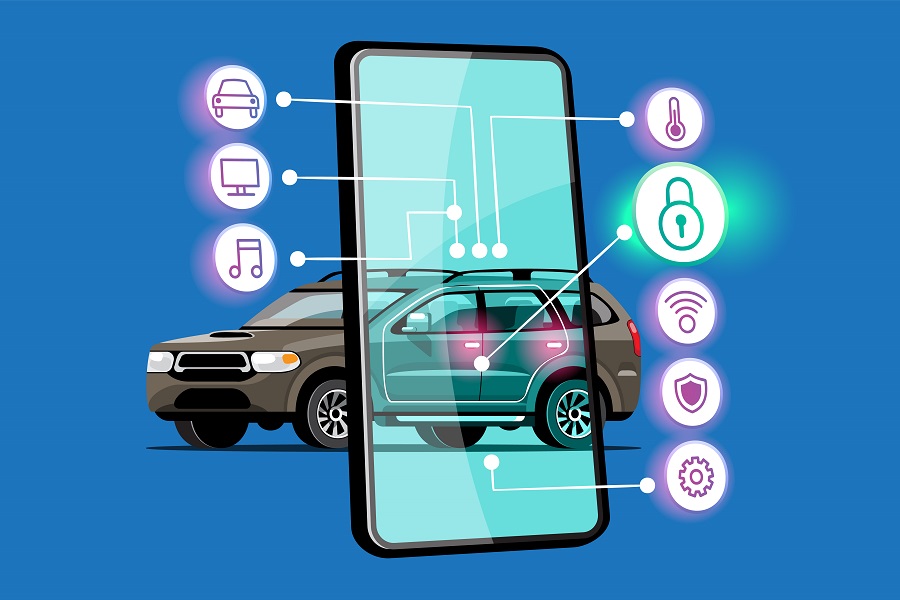
Call On +1(786) 223 3171
Mail Us For Support
Office Address
4624 Hollywood Blvd,
Suite 203-A, Hollywood, FL 33021

It’s undeniable that we are living in times of immense technological change. One might say we’re in the midst of an industrial revolution unlike anything we’ve seen before. And one of the main industries that is impacted is automotive.
Vehicles have long been mechanical machines – wheels and engines, brakes and transmissions. But new advances mean cars are becoming computers on wheels, connected to both infrastructure and each other in fascinating new ways. Through technologies like sensors, 5G networks, and machine learning, vehicles are gaining intelligence and awareness that will change how we experience transportation forever.
On the manufacturing side, companies are leveraging the IoT and automotive industry like never before. By connecting equipment, inventory, and production processes, automakers are optimizing efficiency, reducing waste, and empowering workers at all levels with real-time data. This leads to lower costs, higher quality, and the ability to rapidly test and tweak new designs and processes.
Cars have come a long way since the early days of transportation. What was once simply a machine to get us from point A to B is now a high-tech hub on wheels. Today’s vehicles are packed with sensors, processors, and connectivity that allow them to be more than just a means of travel. They are nodes on the Internet of Things.
This emerging connected car revolution known as IoT automotive has the potential to transform how vehicles function and the experiences they provide. No longer isolated metal boxes, cars can now communicate, share data, and integrate with other smart devices and systems. This paves the way for new conveniences, efficiencies, and possibilities limited only by our imagination.
Under the hood, miles of wire have been replaced by high-speed networks. Sensors monitor countless vehicle functions in real-time, from fuel levels to tire pressure. Onboard computers crunch these analytics to improve performance and predict maintenance. Meanwhile, seamless integration with drivers’ digital lives is empowering convenience through navigation, entertainment, and more.
Also Read: Transforming Businesses With Innovative IT Solutions
The automotive industry is radically disrupted by the Internet of Things (IoT). Connected cars improve road safety, enhance ownership experience, and unlock new revenue streams. Here are some key ways IoT benefits automakers and drivers:
By connecting to the cloud, cars can sense dangers and notify drivers. IoT sensors monitor tire pressure, oil levels, brake wear, and more to prevent breakdowns. Advanced driver-assistance systems use IoT to automatically apply brakes or steer to avoid collisions. Telematics provides crash notification and roadside assistance. This level of safety protection is a game changer.
IoT generates huge amounts of vehicle usage data that automakers can analyze. They gain a wealth of information about driver behavior, preferred features, maintenance needs, and malfunction risks. This helps automakers customize services, launch targeted campaigns, and build more user-focused products. Personalized, data-backed experiences strengthen customer loyalty.
Regular software updates can fix bugs, patch security flaws, and add new capabilities. With IoT connectivity, automakers push these updates wirelessly to vehicles without a shop visit. Drivers always enjoy the latest features and optimizations. Manufacturers save huge costs by avoiding physical recalls and repairs. The automotive experience has continually improved.
Automakers are exploring creative services on top of connectivity platforms. Examples include pay-as-you-drive insurance, integrated toll payments, in-car entertainment, advanced navigation, and more. All bring new revenue streams beyond the initial vehicle sale. As cars become IoT hubs on wheels, the potential for transportation-linked innovations is limitless.
IoT applications in the automotive industry are transforming it completely by connecting vehicles and enriching operations through data insights. Fleet managers, drivers, and mechanics can all benefit from IoT integration.
IoT devices in vehicles collect real-time data on speed, location, fuel use, and driver habits. Fleet managers gain insights from this data to calculate optimal routes, monitor employees, check vehicle performance, and plan maintenance to avoid downtime. For example, DHL’s “SmarTrucking” solution uses sensors to gather traffic and weather data for more efficient scheduling and routing.
Cars can share location, route, and speed with other nearby vehicles using IoT sensors. This helps prevent accidents by notifying drivers of emergencies or slow traffic ahead. It also assists emergency vehicles in navigating traffic smoothly.
IoT continuously monitors engines, fluids, and more to predict potential issues. Analyzing this real-time data detects early problems, alerting drivers instead of waiting for scheduled checkups. This preventative approach avoids expenses while preventing breakdowns.
IoT enables in-car services like navigation, music, calls, and assistance. For example, Volvo’s “Sensus Connect” uses the cloud for advanced mapping, destination sending, and free map updates. This wide connection simplifies car usage.
Using IoT solutions and cameras, smart vehicles can partially control driving, braking, parking, and lanes. They calculate the safest actions to provide assistance and reduce accidents through assisted technologies.
Also Read: A Guide to Healthcare Software Development
In such disruptive times, it’s challenging for any single organization to have all the needed skills and foresight in-house. This is where a partner like Future Vision 360 LLC- a technology development consulting service can help light the path ahead.
Our team of automotive industry veterans and IoT specialists has been helping companies of all sizes successfully navigate this new terrain. We understand both the technology challenges as well as business objectives and regulatory landscapes.
Whether you need help developing an IoT strategy, implementing sensor networks, upgrading legacy systems, analyzing data flows, or training your workforce on new processes – Future Vision 360 LLC has tools and experience for your business. Contact Future Vision 360 LLC IT Consulting Company today to get started.